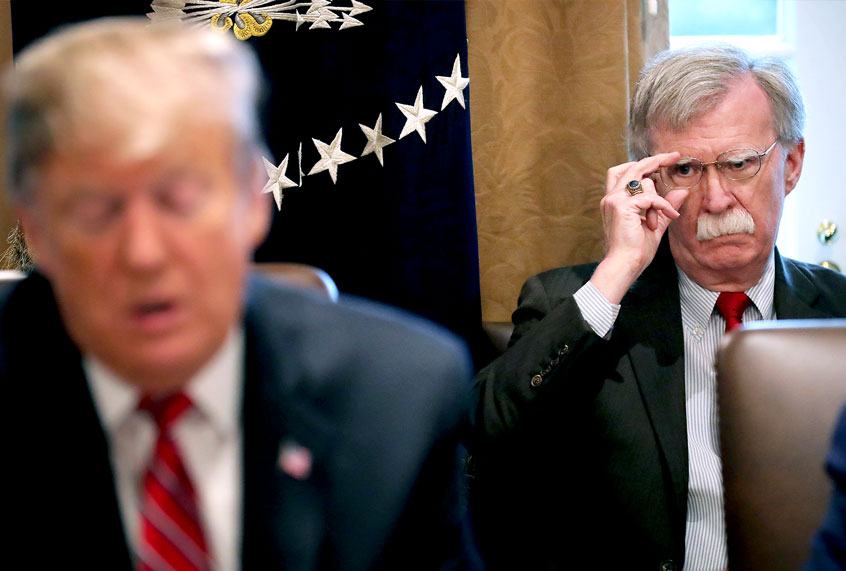World
John Bolton Indicted on 18 Counts, Faces Selective Prosecution Claims

Former United Nations Ambassador and National Security Adviser John Bolton has been indicted on 18 counts of mishandling classified information, marking a significant legal challenge for the controversial figure. This indictment, which exceeds the number of charges typically seen in similar cases under the Espionage Act, raises questions about the motivations behind the prosecution, especially considering Bolton’s contentious relationship with former President Donald Trump.
Bolton’s legal troubles stem from allegations that he improperly shared classified information, including entries from his personal diary, with family members who lacked the necessary security clearances. This situation has drawn comparisons to other high-profile cases involving the mishandling of sensitive information, highlighting a perceived inconsistency in how the justice system addresses these violations.
In August, Bolton’s residence was subject to an armed raid as part of the investigation into his alleged mishandling of classified materials related to his memoir. The charges brought against him, which include both careless retention and transmission of classified information, have been described by some as a troubling example of the government’s increasing reliance on the Espionage Act to target perceived adversaries.
Bolton’s history of inflammatory comments about whistleblowers, including Chelsea Manning and Edward Snowden, complicates his public image. His previous statements advocating for severe penalties for those accused of leaking classified information have led to a complex narrative as he now finds himself in a similar predicament.
Legal Arguments and Implications
Despite the serious nature of the charges, Bolton may have a viable argument for a motion to dismiss based on claims of selective and vindictive prosecution. Legal experts point out that such motions are rarely granted, but Bolton’s circumstances—particularly the public statements made by Trump regarding Bolton’s actions—may provide a unique angle. Trump has openly criticized Bolton, labeling him as “treasonous” and calling for his imprisonment after the release of Bolton’s tell-all book.
The potential for a successful motion hinges on the argument that the prosecution’s actions are not justifiable and may be politically motivated. This kind of defense has been a common strategy among defendants in Espionage Act cases, and Bolton’s legal team is likely to emphasize the public nature of Trump’s animosity towards him.
Additionally, accusations of a two-tiered system of justice in cases involving classified information further cloud the situation. Past instances, such as the leniency shown to former CIA Director David Petraeus and former National Security Adviser Sandy Berger, who faced minimal penalties for similar offenses, have fueled public skepticism about equitable treatment under the law.
Bolton’s case arrives at a time of heightened scrutiny regarding the handling of classified information by government officials. The disparities in consequences for various individuals continue to raise ethical concerns about accountability and the application of justice.
The Broader Context
The implications of Bolton’s indictment extend beyond his personal legal battles. This case illustrates the complexities of national security law and the ongoing debates about transparency and accountability within the government. As Bolton faces charges that could reshape his legacy, the outcomes may also influence future discussions on whistleblowing and the treatment of classified materials.
While Bolton’s history and public persona may not garner widespread sympathy, the principle of fair treatment under the law remains crucial. As the legal proceedings unfold, the question looms—whether even the most controversial figures can expect a fair shake in a system increasingly perceived as politicized.
In an era where the intersection of politics and law is under intense scrutiny, Bolton’s case could set precedents that resonate far beyond his individual circumstances. The legal landscape surrounding classified information and the actions of high-ranking officials is at a critical juncture, and the outcome of Bolton’s situation may have lasting ramifications for all involved.
As events develop, it remains essential for the public to stay informed and engaged in discussions about the implications of these legal battles on democracy and justice.
-

 Sports1 week ago
Sports1 week agoSteve Kerr Supports Jonathan Kuminga After Ejection in Preseason Game
-

 Politics1 week ago
Politics1 week agoDallin H. Oaks Assumes Leadership of Latter-day Saints Church
-

 Business1 week ago
Business1 week agoTyler Technologies Set to Reveal Q3 2025 Earnings on October 22
-

 Lifestyle1 week ago
Lifestyle1 week agoDua Lipa Celebrates Passing GCSE Spanish During World Tour
-

 Entertainment1 week ago
Entertainment1 week agoZoe Saldana Advocates for James Cameron’s Avatar Documentary
-

 World1 week ago
World1 week agoD’Angelo, Iconic R&B Singer, Dies at 51 After Cancer Battle
-

 Lifestyle1 week ago
Lifestyle1 week agoKelsea Ballerini Launches ‘Burn the Baggage’ Candle with Ranger Station
-

 Business1 week ago
Business1 week agoMega Millions Jackpot Reaches $600 Million Ahead of Drawings
-

 Science1 week ago
Science1 week agoChicago’s Viral ‘Rat Hole’ Likely Created by Squirrel, Study Reveals
-

 Health1 week ago
Health1 week agoRichard Feldman Urges Ban on Menthol in Cigarettes and Vapes
-

 Health1 week ago
Health1 week agoCommunity Unites for Seventh Annual Mental Health Awareness Walk
-

 Business1 week ago
Business1 week agoMLB Qualifying Offer Jumps to $22.02 Million for 2024









